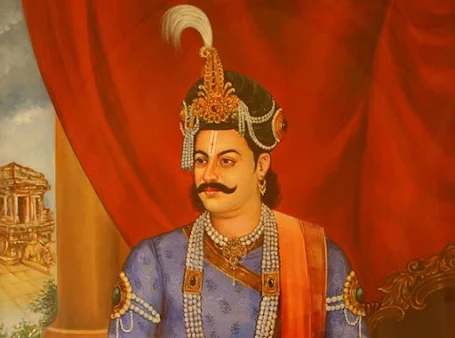Vijayanagara Empire
Harihara and Bukka established Vijayanagar City in 1336 A.D. along the southern banks of the Tungabhadra River, making Hampi its capital. They were loyalists to Vira Ballala III, the Hoysala King, before founding the empire. Their strategic location and allegiance set the stage for the rise of the illustrious Vijayanagara Empire in South India.
The Sangama Dynasty rulers' name
- Harihara I (1336–1356 CE), founder of empire and dynasty
- Bukka Raya I (1356–1377 CE), also the founder of the empire
- Harihara II (1377–1404 CE)
- Virupaksha Raya (1404–1405 CE)
- Bukka Raya II (1405–1406 CE)
- Deva Raya (1406–1422 CE)
- Ramachandra Raya (1422 CE)
- Vira Vijaya Bukka Raya (1422–1424)
- Deva Raya II (1424–1446 CE)
- Mallikarjuna Raya (1446–1465 CE)
- Virupaksha Raya II (1465–1485 CE)
- Praudha Raya (1485 CE), last ruler
The Sangam dynasty was the first dynasty that was ruled by the Vijayanagara Empire. In this dynasty came 12 kings but Harihara and Bukka were famous and who founders of the Sangam dynasty.
The Saluva Dynasty
The Saluva dynasty was the second dynasty to rule the Vijayanagara Empire and was created by the Saluvas, who by historical tradition were natives of the Kalyani region of northern Karnataka in modern India. The term "Saluva" is known to lexicographers as "hawk" used in hunting. They later spread into the east coast of modern Andhra Pradesh, perhaps by migration or during the Vijayanagara conquests during the 14th century.
- The Saluva Dynasty Ruler Names
- Saluva Narasimha Deva Raya (1485–1491 CE), first ruler
- Thimma Bhupala (1491 CE)
- Narasimha Raya II (1491–1505 CE), last ruler
The Tuluva Dynasty
Tuluva is the name of the third dynasty of the Vijayanagara Empire. The dynasty traces its patrilineal ancestry to Tuluva Narasa Nayaka, a powerful warlord from the westerly Tulu-speaking region.
- The Tuluva Dynasty Ruler Names
- Tuluva Narasa Nayaka
- Viranarasimha Raya
- Krishnadevaraya
- Achyuta Deva Raya
- Venkata - I
- Sadasiva Raya
Krishnadeva Raya, hailing from the esteemed Tuluva dynasty, stands out as the most renowned monarch of the Vijayanagara Empire. His reputation transcends borders, as noted by Domingo Paes, a Portuguese traveler, who hailed him as the epitome of a formidable and exemplary ruler.
Under Krishnadeva Raya's reign, Vijayanagara reached the zenith of its power and prosperity. His astute leadership and military prowess instilled fear among adversaries while earning admiration from allies. Krishnadeva Raya's administration was marked by efficiency, justice, and economic growth, fostering a golden age for the empire.
Beyond his political acumen, Krishnadeva Raya was a notable patron of arts, literature, and architecture. His court attracted scholars, poets, and artists, contributing to the flourishing of culture and intellectual pursuits. The legacy of his patronage endures through timeless works of literature and architectural marvels that dot the landscape of South India.
The Aravidu Dynasty
The Aravidu Dynasty was the fourth and last Hindu dynasty of the Vijayanagara Empire in South India. Its founder was Tirumala Deva Raya, whose brother Rama Raya had been the masterful regent of the last ruler of the previous dynasty.
- The main rulers of the Aravidu dynasty were:
- Rama Raya (1542–1565 CE), first ruler
- Tirumala Deva Raya (1565–1572 CE)
- Sriranga Deva Raya (Sriranga I) (1572–1586 CE)
- Venkatapati Deva Raya (Venkata II) (1586–1614 CE)
- Sriranga II (1614–1617 CE)
- Rama Deva Raya (1617–1632 CE)
- Peda Venkata Raya (Venkata III) (1632–1642 CE)
- Sriranga III (1642–1652 CE), the last ruler of the dynasty and empire
After the fall of the Vijayanagar Empire in the 17th century, the Aravidu dynasty continued their rule by establishing themselves as the Rajas of Anegundi. Though they no longer held active political power, their descendants are still revered and respected due to their historical lineage and connection with the Vijayanagar Empire.
These are about the Vijayanagara Empire dynasty and which king ruled in the Empire. If you want to study more about the Vijayanagara Empire question answers for the class 12 board exam and another upcoming competitive exam. These Notes for help you.

